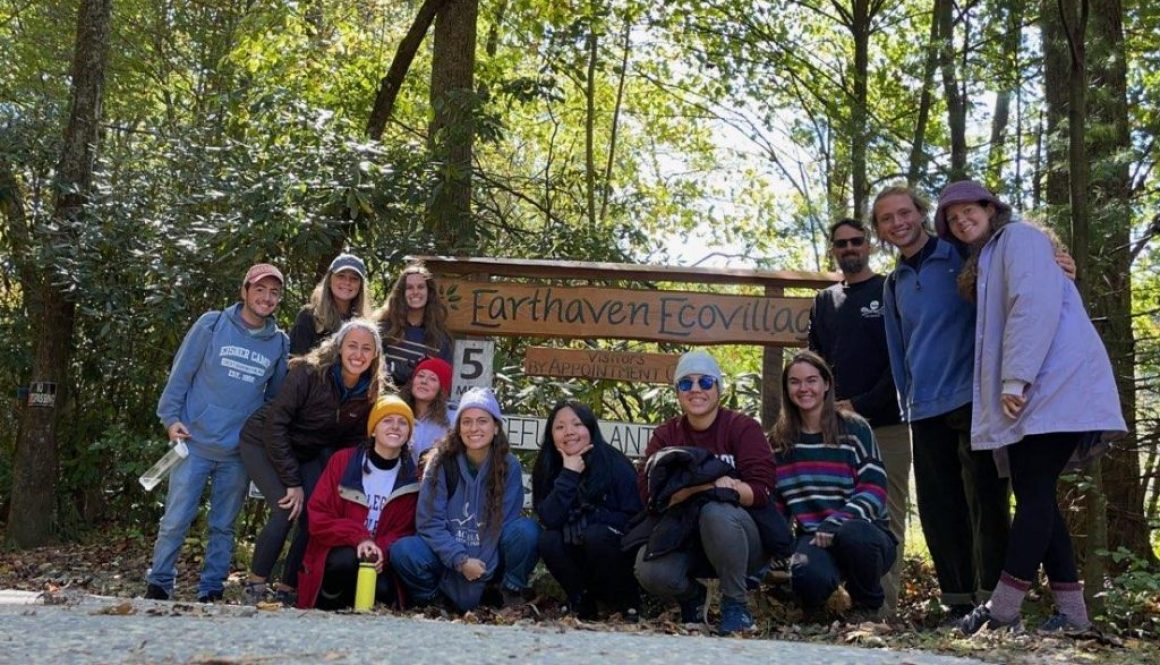Earthaven Ecovillage
Author: Kate Liseo
Over fall break, I took a journey to Earthaven Ecovillage near Asheville, North Carolina, with my honors Spiritual Activism and the Climate Crisis course led by Dr. Todd LeVasseur. This intentional community spans over 300 acres and currently has about 115 residents. Their power is entirely off-grid, coming from hydroelectric and solar. Additionally, they have greywater and humanure compost systems, emphasizing the importance of recycling valuable resources back into use rather than labeling them as waste. Their intimate relationship with their environment and each other gave me a new breath of hope for a sustainable future, along with a playful and loving connection to the new friends I made on our journey there.
While one might think an eco-village meets all the marks of a sustainable utopia, Earthaven leaders acknowledge that they are not impervious to the complications of human communities as well as capitalism. NikiAnne, our loving guide for the week, talked with us about multiple areas Earthaven is working on, such as diversity and intergenerational communication, and she mentioned how Earthaven is an experimental microcosm of the macrocosm. For example, the land is still taxed, and many villagers have jobs outside of the village to support themselves. Sometimes their houses must be built with materials not found in the land, and the land does not provide 100% of their food.
But this fact did not leave me hopeless: in fact, the opposite. Knowing that this community that seems so far removed from the “real world” still faces the challenges that come with being human gives me hope that we can work from within the system and do not have to be entirely removed from every single subfactor of patriarchal capitalist society to make change. Nor do we have to be perfect people because those don’t exist either. We can start where we are and come together to move forward.
One key aspect of working on oneself found in the village is the importance they place on grief and gratitude. Bottling up grief and suppressing it the way society tells us to only divides us further from each other and the world around us. How can we be prepared to take care of others or the wicked problem of climate change if we aren’t taking care of ourselves? And how can we care for the world if we don’t process and truly feel our gratitude for it? Working with and through our grief and expressing our gratitudes establishes a foundation to take on the hardships of climate work, which we all know takes a village.
I am so grateful to have been welcomed into such a beautiful place, and I take with me a new sense of love for tears and vulnerability, as well as the importance of creating space for others to do the same. If Earthaven interests you, they have campgrounds that you are allowed to stay at (for a fee). Check out this site for more information: https://www.earthaven.org/.
Cover photo by Kate Liseo.
About the author:
Kate Liseo is a senior majoring in Psychology and minoring in Sociology and Environmental and Sustainability Studies. After taking a Psychology course with a foundation in Environmental Studies freshman year, she became interested in looking at sustainability through a psychological lens with questions like “what aspects of the human condition brought us to this point?” or “how can we consciously allow this to continue?” With these questions, she hopes to continue exploring the most effective ways to change perspectives on our current mode of operation. Aside from interning with the Center, she is the president of the Vegan Club and a member of Alliance for Planet Earth and CofC Climate Coalition. Outside of school, she loves to cook, rollerblade, and forage for mushrooms.
